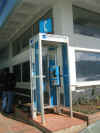St. Lucia Case Study
 The most striking aspect of the St. Lucia information and
communication technology (ICT) market is the rapid growth of mobile. Competition
to the incumbent Cable & Wireless was introduced in March 2003 when Digicel-an
Irish-owned, pan-Caribbean mobile company-entered the market as the second
operator. AT&T Wireless launched its operation a month later. Six months
after the introduction of mobile competition, the telecom regulator reported
132'700 subscriptions, resulting in a penetration rate of 83 per cent of the
population. An amazing result, considering that the number of mobile subscribers
per 100 inhabitants stood at only nine in December 2002. Coverage is over 90 per
cent of the population and there are now more mobile than fixed telephone
subscribers. The intense competition has resulted in among the lowest mobile
tariffs in the region. It is notable that mobile operators were allowed to
provide their own international services. As a result, international call prices
have dropped significantly. The most striking aspect of the St. Lucia information and
communication technology (ICT) market is the rapid growth of mobile. Competition
to the incumbent Cable & Wireless was introduced in March 2003 when Digicel-an
Irish-owned, pan-Caribbean mobile company-entered the market as the second
operator. AT&T Wireless launched its operation a month later. Six months
after the introduction of mobile competition, the telecom regulator reported
132'700 subscriptions, resulting in a penetration rate of 83 per cent of the
population. An amazing result, considering that the number of mobile subscribers
per 100 inhabitants stood at only nine in December 2002. Coverage is over 90 per
cent of the population and there are now more mobile than fixed telephone
subscribers. The intense competition has resulted in among the lowest mobile
tariffs in the region. It is notable that mobile operators were allowed to
provide their own international services. As a result, international call prices
have dropped significantly.
St. Lucia, is Small Island Developing State (SIDS) is an example
of the new competitive environment that has spread to members of the
Organization of East Caribbean States (OECS). The regional telecommunication
regulator, the Eastern Caribbean Telecommunication Authority (ECTEL), has been
instrumental in this transformation through licensing guidelines and
negotiations with the incumbent operator to accelerate liberalization. The entry
of multiple mobile operators in all of the ECTEL members-whose five members have
a total population in the vicinity of half a million-refutes the historical
argument that small market size is a barrier to competition.
Although St. Lucia's entire telecommunication market is
theoretically liberalized, competition has developed only in mobile and
international services, and so far not spread to other market segments. One
project that will help St. Lucia's transition to an information society is the
Public Sector Reform Project, financed with external assistance. It has an ICT
component that calls for enhancing e-government services. St. Lucia already
ranks high in e-government in the region with all ministries linked on a
government network. The nation's tertiary institution, all secondary and almost
all primary schools have Internet access through an educational network. It is
envisioned that the future universal service policy would include provisions for
providing broadband access to schools and other localities such as libraries and
post offices.
A mission to St. Lucia was carried out from 15-19 December 2003,
involving Michael Minges, Vanessa Gray, and Philip Cross. The mission and
interviews were coordinated with the Ministry of Communications, Works,
Transport and Public Utilities.
St. Lucia Case Study
 PDF file (2.7 Mb)
PDF file (2.7 Mb)
|
See St. Lucia photos

|
|



